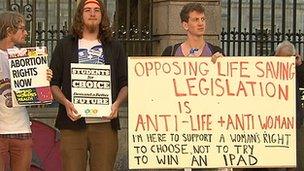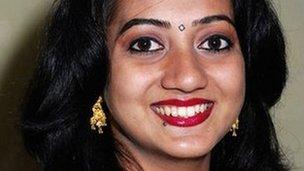Irish politicians in all-night debate on abortion bill
- Published

Supporters of access to termination outside the Irish parliament
The final debate on a bill allowing limited abortion in the Republic of Ireland has been adjourned following an all-night session in the lower house of the Irish parliament.
Members of the Dáil spoke until 04:57 BST on Thursday.
They are due to resume the debate on the Protection of Life During Pregnancy Bill later this afternoon.
The Irish government won the first two votes on a range of amendments - more than 160 have been tabled.
By the end of the debate only 11 of the 166 amendments had been dealt with, making it more likely that the government will cut short the debate and introduce a guillotine order later.
European Affairs Minister Lucinda Creighton voted with the government in the two overnight votes, but is expected to go against the measure later this evening. If she does so, she will lose her job and will automatically be expelled from the Fine Gael party.
In a surprise development in the last vote of the debate, Labour TD Michael McNamara from Clare voted against the government. His party said he had made a genuine mistake and pushed the wrong voting button.
The bill allows for a termination when three doctors unanimously agree that a woman is at risk of taking her life.
Anti-abortion activists say the measure could lead to more widespread abortion.
Others argue the bill is too limited as it does not allow for terminations in cases of rape or incest, or when there is a foetal abnormality.
Nor does it allow for termination when the foetus cannot survive outside the womb.
Anti-abortion campaigners say that the bill will allow the intentional killing of the unborn for the first time in the Republic of Ireland.

Anti-abortion activists want the law to remain unchanged
For them, in a largely Catholic country, it is not just a religious but a human rights issue as they believe that in any pregnancy the mother and foetus have equal rights to life.
Uncertainty
Members of parliament (TDs) who support access to abortion say the bill ignores the fact that, on average, 11 women leave the country every day for an abortion in Britain.
Since a Supreme Court ruling in 1992, known as the X case, abortion has been constitutionally available when a woman's life, as distinct from her health, is at risk from the continued pregnancy.
X was a suicidal 14-year-old schoolgirl who had been raped by a neighbour and was initially prevented from leaving the country for an abortion in Britain.
Since then, the credible threat of suicide is, constitutionally, regarded as grounds for a termination.
But in the intervening years, until now, no government has introduced legislation to give doctors legal certainty on when an abortion can be carried out.
And that uncertainty provided part of the context for the Savita Halappanavar case.
She was a 31-year-old Indian dentist who was admitted to hospital in Galway in October 2012 while miscarrying.
Failures

The death of Savita Halappanavar drew attention to the lack of clarity about the legal position on termination
She died a week later from septicaemia.
Her request for an abortion was turned down.
Her inquest heard that she could not get a termination at the time because her life was not in danger but, by the time her life was at risk, an abortion would have been too late to save her.
Her inquest also heard there were systems failures in her health care.
The Fine Gael-Labour coalition government says its proposed legislation will bring the law and constitution into line.
In a vote last week, the government had an overwhelming 138 to 24 vote majority.
- Published12 June 2013
- Published1 May 2013
- Published30 April 2013
- Published24 April 2013
- Published23 April 2013
- Published19 April 2013
- Published2 February 2013